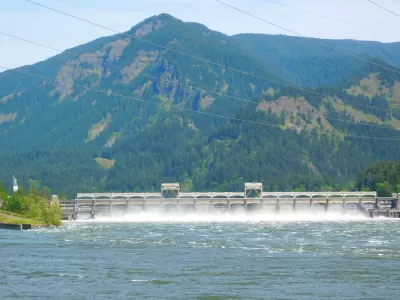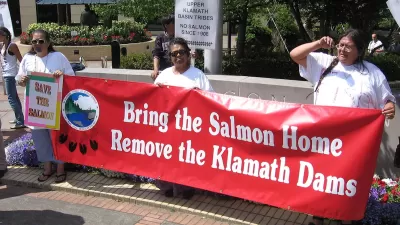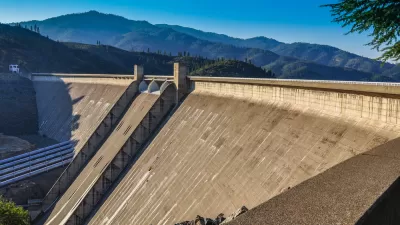The federal government appears to be reneging on yet another promise to Native American tribes.

The Office of Management and Budget has abruptly rejected the U.S. Army Corps' request for $1.6 million to plan and develop a new town for several Native tribes at the Washington-Oregon border.
The new development was planned to replace a number of towns that were destroyed by the construction of a series of dams on the Columbia River beginning in the 1930s. "Since then, many Native Americans have lived at least six months out of the year on 30 fishing sites not made for full-time human habitation," often with limited access to restrooms, Molly Harbarger explains in The Oregonian. The government recognized its obligation to replace the lost homes in 2016.
To do so, the U.S. Army Cops had requested $1.6 million out of a fund normally used to maintain the lower river basin, which was experiencing a surplus. All signs pointed to the transfer being approved, and the planning process for the new town had begun.
Now, the White House's surprise decision "has again left hundreds of Native Americans in unsafe, unsanitary makeshift housing for the foreseeable future," Harbarger notes.
FULL STORY: Planning for Columbia River tribal village stalls after funding denied by White House

Maui's Vacation Rental Debate Turns Ugly
Verbal attacks, misinformation campaigns and fistfights plague a high-stakes debate to convert thousands of vacation rentals into long-term housing.

Planetizen Federal Action Tracker
A weekly monitor of how Trump’s orders and actions are impacting planners and planning in America.

In Urban Planning, AI Prompting Could be the New Design Thinking
Creativity has long been key to great urban design. What if we see AI as our new creative partner?

King County Supportive Housing Program Offers Hope for Unhoused Residents
The county is taking a ‘Housing First’ approach that prioritizes getting people into housing, then offering wraparound supportive services.

Researchers Use AI to Get Clearer Picture of US Housing
Analysts are using artificial intelligence to supercharge their research by allowing them to comb through data faster. Though these AI tools can be error prone, they save time and housing researchers are optimistic about the future.

Making Shared Micromobility More Inclusive
Cities and shared mobility system operators can do more to include people with disabilities in planning and operations, per a new report.
Urban Design for Planners 1: Software Tools
This six-course series explores essential urban design concepts using open source software and equips planners with the tools they need to participate fully in the urban design process.
Planning for Universal Design
Learn the tools for implementing Universal Design in planning regulations.
planning NEXT
Appalachian Highlands Housing Partners
Mpact (founded as Rail~Volution)
City of Camden Redevelopment Agency
City of Astoria
City of Portland
City of Laramie





























